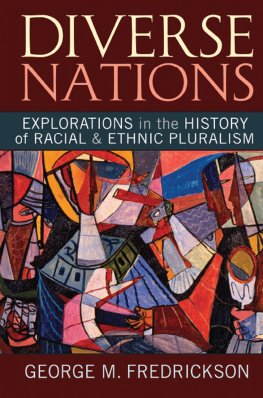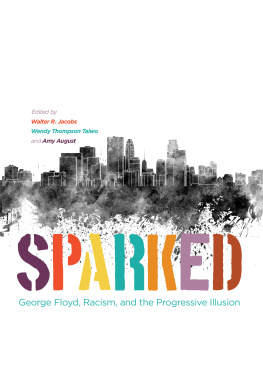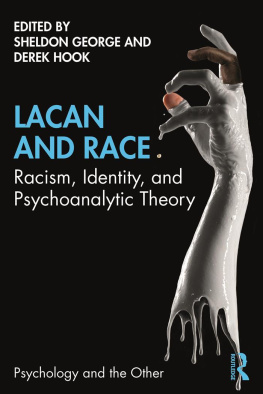George M. Fredrickson - Racism
Here you can read online George M. Fredrickson - Racism full text of the book (entire story) in english for free. Download pdf and epub, get meaning, cover and reviews about this ebook. year: 2002, publisher: Princeton University Press, genre: Politics. Description of the work, (preface) as well as reviews are available. Best literature library LitArk.com created for fans of good reading and offers a wide selection of genres:
Romance novel
Science fiction
Adventure
Detective
Science
History
Home and family
Prose
Art
Politics
Computer
Non-fiction
Religion
Business
Children
Humor
Choose a favorite category and find really read worthwhile books. Enjoy immersion in the world of imagination, feel the emotions of the characters or learn something new for yourself, make an fascinating discovery.

- Book:Racism
- Author:
- Publisher:Princeton University Press
- Genre:
- Year:2002
- Rating:4 / 5
- Favourites:Add to favourites
- Your mark:
- 80
- 1
- 2
- 3
- 4
- 5
Racism: summary, description and annotation
We offer to read an annotation, description, summary or preface (depends on what the author of the book "Racism" wrote himself). If you haven't found the necessary information about the book — write in the comments, we will try to find it.
Racism — read online for free the complete book (whole text) full work
Below is the text of the book, divided by pages. System saving the place of the last page read, allows you to conveniently read the book "Racism" online for free, without having to search again every time where you left off. Put a bookmark, and you can go to the page where you finished reading at any time.
Font size:
Interval:
Bookmark:
RACISM

PRINCETON UNIVERSITY PRESS PRINCETON AND OXFORD
GEORGE M. FREDRICKSON

A Short
History
with a new foreword by Albert M. Camarillo
Copyright 2002 by Princeton University Press
Foreword to the Princeton Classics Edition Copyright
2015 by Princeton University Press
Published by Princeton University Press, 41 William Street,
Princeton, New Jersey 08540
In the United Kingdom: Princeton University Press,
6 Oxford Street, Woodstock, Oxfordshire OX20 1TW
All Rights Reserved
First Princeton Classics edition printing, with a new foreword by Albert M. Camarillo, 2015
Paperback ISBN 978-0-691-16705-3
Printed on acid-free paper.
press.princeton.edu
Printed in the United States of America
10 9 8 7 6 5 4 3 2 1

For
Donald Fleming,
mentor and
friend

PRINCETON CLASSICS EDITION

Racism: A Short History, published in 2002, was among the last of the many books written by George M. Fredrickson in a long and distinguished career. One of the great historians of his generation and an internationally renowned author, Fredricksona dear friend and colleague of mine for over twenty-five yearscould not have written Racism early in his career. This seminal overview, a history about shifting ideologies and practices that hinged on ideas about difference and power and the incalculable misery they afflicted on the human condition through the ages, was the product and synthesis of a lifetime of research, teaching, and thinking about the origins of racism. For more than four decades, Fredricksons major contributions on the topic influenced two generations of students and colleagues alike. I remember well, when I was a new graduate student in 197071 with a keen interest in the history of race relations in America, that my understanding about the intellectual foundations of racial thought was deeply influenced by Fredricksons second book, The Black Image in the White Mind (1971). And I, like others who were curious about racism as a transnational phenomenon, found in his third major book, White Supremacy: A Comparative Study of American and South African History (1981), path breaking perspectives on how ideologies of difference based on a white/black paradigm created societies where race defined ones life chances from birth to death.
Fredrickson joined the Stanford Department of History faculty in 1984, and a few years later we began a decade long collaboration, co-teaching a course on race in the American experience. I viewed firsthand how Fredrickson continued to refine his thinking about race as an idea: its origins, continuities, and changes across time and space. Racism: A Short History was, thus, the culmination of Fredricksons lifelong intellectual journey as a historian in pursuit of understanding how ideas about race evolved and infected modern western societies. The publication of the Princeton Classics edition of Racism is testament to the durable intellectual contributions made by George M. Fredrickson in the study of race and its byproducts.
Although I first met Fredrickson when he was a Northwestern University professor visiting Stanford as a fellow at the Center for Advanced Study in the Behavioral Sciences in 197778, it was not until he joined the Stanford faculty that I learned how his personal experiences with race relations were intimately linked to his academic interests. Born in Connecticut but raised in Sioux Falls, South Dakota, he attended Harvard University for both his undergraduate and graduate studies. Fredrickson was among the hundreds of white college students who traveled to the South to support civil rights efforts during some of the most violent years of struggle for African Americans. Later, as a young faculty member at Northwestern, he supported the rights of students to demonstrate peacefully against the war in Southeast Asia and was a strong advocate for the development of Black Studies on campus. When I learned about this personal background, I came to understand better the passion that he brought to the study of race, an intellectual passion shaped in part by his personal commitment to racial equality.
Fredricksons reputation as one of the premier comparative historians of raceand comparative history in generalwas cemented with the publication of White Supremacy, which won the Merle Curti Award from the Organization of American Historians and the Ralph Waldo Emerson Award from the Phi Beta Kappa Society, and was a finalist for the Pulitzer Prize in 1982. Anchored by his masterful understanding of slavery and white/black relations in the American South, Fredrickson ventured into South African history to produce a brilliant comparative analysis. With great clarity and insight, White Supremacy is a model for comparative historians to follow. Fredricksons book illuminates how different national histories and circumstances, the role of federal governments and their institutional policies, framed by ideologies about racial differences, combined to form two distinctive systems of race relations across the Atlantic. White Supremacy was the springboard in Fredricksons continuing search for understanding the origins of racial thought beyond national, cultural, and religious boundaries.
In 1988, seventeen of Fredricksons essays and articles, most of which were written during the previous twenty years and based on research for The Black Image in the White Mind and White Supremacy, were published as The Arrogance of Race: Historical Perspectives on Slavery, Racism, and Social Inequality. This collection delves deeper into some issues not fully explored in his two previous books and, in the authors words, was intended to provide commentary on other historians interpretations so as to engage dialogue and debate among scholars [because] it is not only healthy but also indispensable to the historical enterprise. The book was, he said, my contribution to the ongoing discussion of the role of race in American history. Again, Fredricksons scholarship reflected a personal concern for social inequality, whether in the U.S., South Africa, or elsewhere. Placing racial inequality in the broader context of class inequality framed by Marxian analyses, Fredrickson stated in the introduction of the book both his theoretical stance and his personal abhorrence for racism under any regime:
I regard racial injustice as a distinctive evil, more heinous than the class inequality found in liberal capitalist societies. What occurred in the American South during the era of slavery and segregation, what is occurring now in South Africa, andto take the extreme case of racism carried to its logical conclusionwhat happened in Germany during World War II make it hard to deny that demoting other people from the ranks of humanity on grounds of race or ethnicity, and treating them accordingly, is a sin of unique and horrendous character. (The Arrogance of Race, 7)
Obviously, the death knell of apartheid in South Africa weighed heavily on his mind in 1988. The end of this system of racial inequality in the early 1990s prompted Fredrickson to broaden his analysis of racism as a concept and as a system of social relations. So, too, did teaching courses at Stanford University on comparative studies of race and ethnicity in America and sharing ideas with colleagues whose work also focused on race and ethnic relations. By co-teaching courses with him throughout the 1990s and co-sponsoring a faculty seminar, I witnessed firsthand how Fredrickson expanded the scope and chronology for understanding racism and its various effects on groups in the U.S. and elsewhere.
Next pageFont size:
Interval:
Bookmark:
Similar books «Racism»
Look at similar books to Racism. We have selected literature similar in name and meaning in the hope of providing readers with more options to find new, interesting, not yet read works.
Discussion, reviews of the book Racism and just readers' own opinions. Leave your comments, write what you think about the work, its meaning or the main characters. Specify what exactly you liked and what you didn't like, and why you think so.







